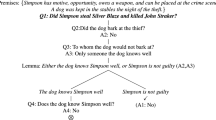Abstract
Arthur C. Danto’s Analytical Philosophy of History has a Kantian ambition: to state the conditions that make historical knowledge possible and to show “the unhappy destiny” that attends attempts to extend modes of representation beyond these conditions. Even though Danto’s book fails to achieve this ambition, it succeeds in making a number of important—if neglected—suggestions in the course of its attempt. One concerns the significance of the progressive tense for our thinking about human agency. Another concerns the way agency can impact negatively on the possibility of foreknowledge.
Similar content being viewed by others
Notes
Trans. W. Hastie, in P. Gardiner (ed.) Theories of History (Glencoe: Free Press, 1959), p. 23. Cited in Arthur C. Danto, Narration and Knowledge 3rd edition, including the integral text of Analytical Philosophy of History [1968] (New York: Columbia University Press, 2007), p. 3–4.
Danto, Narration and Knowledge, p. 257.
Danto, Narration and Knowledge, p. 257.
Danto now thinks of his earlier talk of “narrative sentences” as a kind of joke, and makes clear that his concern was always historical representation and historical knowledge. See his ‘Response to Ankersmit’ in D. Herwitz and M. Kelly (eds.) Action, Art, History: Engagements with Arthur C. Danto (New York: Columbia University Press, 2007).
The conditions in question are conditions on something’s so much as being a possible instance of knowledge of a certain sort. It is possible for something to meet the conditions but not be an actual instance of knowledge of this sort. But it is not possible for something to be an actual or possible instance of knowledge of this sort but not meet the conditions. Conditions of this sort are examined in detail in Henry E. Allison, Kant’s Transcendental Idealism: An Interpretation and Defense, revised and enlarged edn. (New Haven: Yale University Press, 2004).
Danto, Narration and Knowledge, p. 143.
Danto, Narration and Knowledge, p. 151. Danto sometimes talks of an Ideal Chronicler (for reasons that will shortly become clear). But the crucial thing about the Ideal Chronicler is that he is—merely—an ideal witness.
Danto, Narration and Knowledge, p. 149.
Danto, Narration and Knowledge, p. 146.
Danto’s other contributions to the philosophy of action are to be found in his Analytical Philosophy of Action (Cambridge: Cambridge University Press, 1973).
Danto, Narration and Knowledge, p. 159.
Of course this is not an uncontroversial notion of reference. But it seems as if the position under discussion needs it, or something like it, if it is to make good on its claim that sentences descriptive of action are narrative sentences.
No doubt it is an analytic truth that if there is a ringing of the bell then there is the bell’s ringing. But Davidson has taught us that that is no obstacle to the first’s event’s being a cause of the second. And his case seems to turn on the fact that the former event satisfies at least one another description that cannot be pressed into such a truth; ‘a pulling of the cord’, for example. (It may be true that if there is a pulling of the cord then there is a ringing of the bell. But that cannot be an analytic truth.) See Donald Davidson, ‘Actions, Reasons, and Causes’ (1963), in his Essays on Actions and Events (Oxford: Oxford University Press, 2001).
Of course some philosophers once thought they could so consist. For a good overview and critique of the relevant literature, see Helen Steward, The Ontology of Mind: Events, Processes, and States (Oxford: Oxford University Press, 1997).
It is not my argument; it is Michael Thompson’s. See his ‘Naïve Action Theory’, in his Life and Form (forthcoming). Thompson’s paper is but one of a number of recent attempts to come to terms with the significance of the progressive for our thinking about action. Other examples include: Kevin Falvey, ‘Knowledge in Intention’, Philosophical Studies, vol. 99, no. 1 (2000), pp. 21–44; and John McDowell, ‘Intention in Action’, Howison Lecture U.C. Berkeley (2006). Each of these philosophers is following a path that Danto traced for us back in 1968.
Danto, Narration and Knowledge, p. 194.
Lydia Goehr makes much of the importance of this point for Danto’s arguments. See Goehr ‘Afterwords: An Introduction to Arthur Danto’s Narration and Knowledge (including his Analytical Philosophy of History), in Danto, Narration and Knowledge. But because Danto’s concern is historical knowledge and historical representation, he needs to claim that his first argument applies to propositions as well as to sentences, and that is a distinct point.
Danto, Narration and Knowledge, p. 180.
That may include historians’ starting to be interested in various events. But it needs not do so.
To pick an example at random: see Timothy Williamson, Knowledge and its Limits (Oxford: Oxford University Press, 2000).
For a recent attempt to flesh out this idea, see Duncan Pritchard, Epistemic Luck (Oxford: Oxford University Press, 2005).
Author information
Authors and Affiliations
Corresponding author
Rights and permissions
About this article
Cite this article
Haddock, A. Danto’s Dialectic. Philosophia 36, 483–493 (2008). https://doi.org/10.1007/s11406-008-9157-1
Received:
Revised:
Accepted:
Published:
Issue Date:
DOI: https://doi.org/10.1007/s11406-008-9157-1




